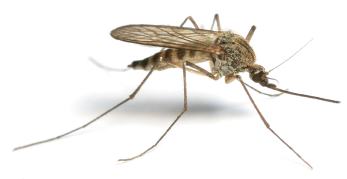FAQ's
What Are Mosquitoes?
 Mosquitoes are not only blood suckers from humans and animals but are also responsible for the transmission of certain diseases, of which some of them can be fatal. Mosquitoes have piercing and sucking mouthparts. They are attracted to their hosts once they detect warmth, moisture from the body and carbon dioxide being breathed out. Sweat on human bodies may also be an attractant.
Mosquitoes are not only blood suckers from humans and animals but are also responsible for the transmission of certain diseases, of which some of them can be fatal. Mosquitoes have piercing and sucking mouthparts. They are attracted to their hosts once they detect warmth, moisture from the body and carbon dioxide being breathed out. Sweat on human bodies may also be an attractant.
Female mosquitoes are the blood suckers.
Irritation usually arises when the female injects saliva into the skin to serve as an anticoagulant to keep the blood flowing. The female requires a blood meal before she can lay eggs, which are placed on the surface of water. These then hatch into aquatic larvae or ‘wrigglers’ which feed on minute organic particles in the water. When fully grown they pupate into mobile pupae known as ‘tumblers’. The adult mosquito that hatches from the pupa has long leg and one pair of wings. The male mosquito is not a blood sucker; however they feed on plant secretions. The life cycle of a mosquito can be completed within a week, but is usually longer. During that time mosquitoes can spread over several kilometres.
Millions of lives are lost annually throughout the world by diseases transmitted by the female mosquito. There are several types of diseases which are transmitted:
- Protozoan diseases such as malaria
- Worm diseases such as filariasis and dog heart worm
- Virus diseases such as dengue fever yellow fever, Murray Valley encephalitis and Ross River (epidemic polyarthritis) viruslitis and Ross River (epidemic polyarthritis) virus
What Kinds of Mosquito Species Are There?
The average homeowner will not be able to identify the many species of mosquitoes which occur in Australia. Some diseases are specific to certain mosquito species which are found in Australia. Some of these are listed below:
- Brown House Mosquito, likely the carrier of filariasis and dog heartworm
- Common Banded Mosquito, likely carrier of Murray Valley encephalitis, dog heartworm and Ross River fever.
- Domestic Container Mosquito is a carrier of myxomatosis and dog heartworm
- Dengue Mosquito is a carrier of dengue fever and dog heartworm
- Common Australian Anopheline is a likely carrier of myxomatosis, malaria and filariasis
How Do You Get Rid Of Mosquitoes?
1. The most effective way to get rid of mosquitoes is to reduce the number of breeding sites. This can be anywhere or anything that holds stagnant water such as pools, dams, swamps, fish ponds, blocked gutters, pot plants, etc.
2. Installation of door and window insect screens can help keep mosquitoes from entering a home or commercial premises.
3. Chemical application to surface areas where mosquitoes rest or harbour.
4. Install electric mosquito traps or bug zappers
5. Citronella candles, sandalwood sticks, mosquito coils, citronella oil burners, etc are all effective deterrents for mosquitoes.
6. Insect repellents applied to skin and clothing can help prevent mosquitoes from biting.
Non-Chemical methods
Non-chemical methods can significantly reduce populations, mainly by the elimination of breeding sites, which can be anywhere water is held such as swimming pools, swamps, dams, rock pools and anything which can hold water for some time. Guttering around a roof that holds old water is a major breeding ground for mosquitoes. Door and window screens affect the entry of mosquitoes into houses, but do not reduce the numbers.
Chemical methods
Chemical methods used against the adults and larvae will decrease numbers; however the treatment of larvae will have a greater impact on reducing the mosquito population. Treatment of larvae is often done by applying a thin film of oil on the surface of the water. The oil blocks the breathing tubes of the larvae and pupae.
Surface sprays of insecticides can be effective for up to a few months. Space sprays of non-residual insecticides can temporarily reduce adult populations inside homes.
Repellents prepared as lotions and aerosols give protection against mosquito bites for only a few hours. Electric zappers and mosquito coils which produce smoke are mainly used outdoors. Some natural materials such as citronella have short-term repellent effects.
The elimination of breeding sites is the most effective long term solution.
